Fostering Action to Prevent Violence Against Women and Girls through Innovative Community Mobilization Approach in Ethiopia
Date:
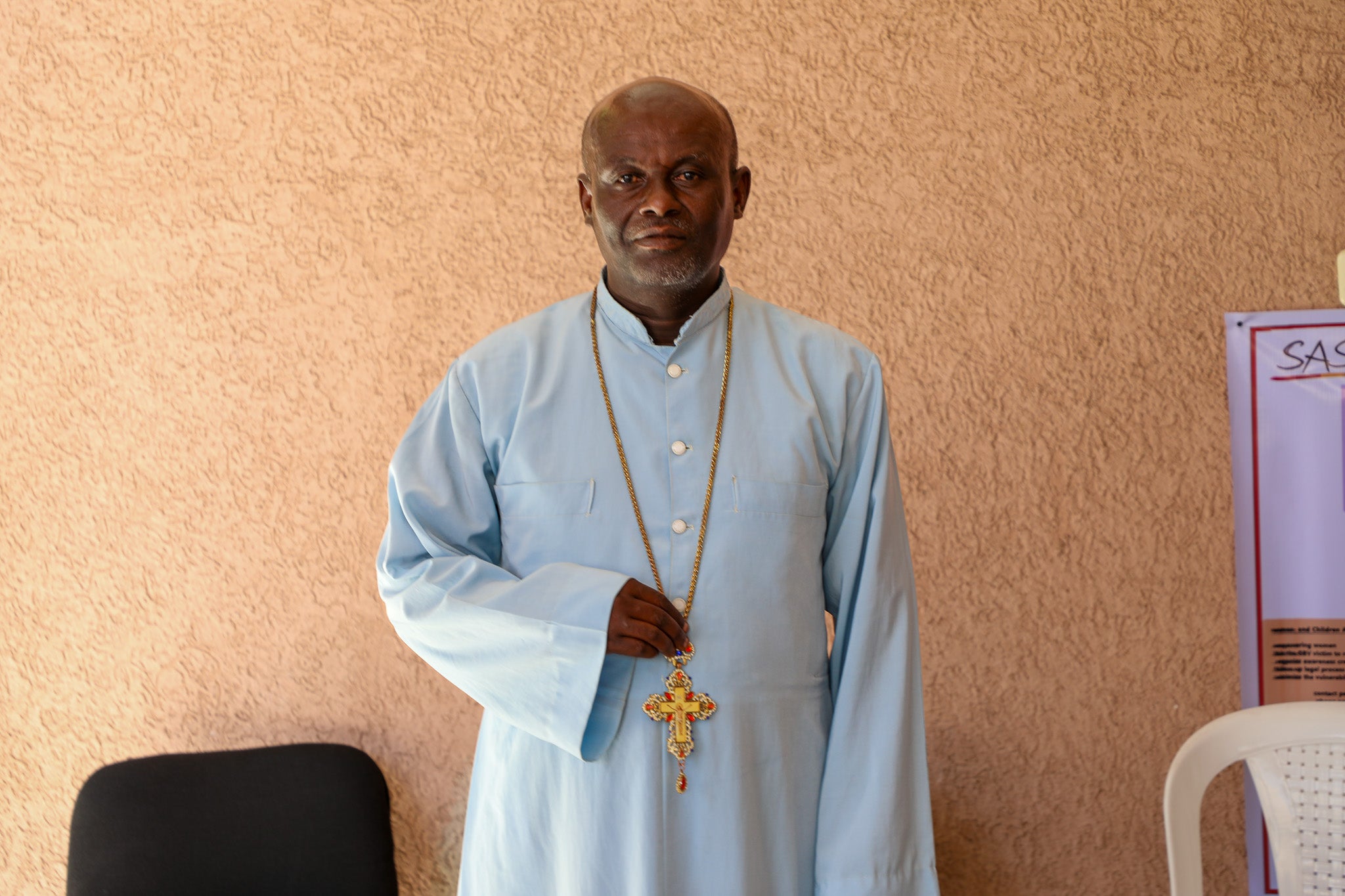
Memhir Biruk Bekele, a preacher and spiritual leader at St. Mary’s Church in Adama, a SASA! community Activist. Photo: UN Women/Tensae Yemane
For Memhir Biruk Bekele, a preacher and spiritual leader at St Mary’s church in Adama, under East Oromia Diocese of the Ethiopian Orthodox Tewahedo Church, participating in mediation and reconciling perpetrators of violence with the survivor or her family , was part of his services, as that was a practice by other religious leaders as well. Then seeing his influence and position he was granted in society; he was selected to participate in SASA! Program, supported by UN Women and implemented by Association of Woman in Sanctuary and Development (AWSAD) in three districts of Adama, Oromia region.
SASA! which also means NOW in Kiswahili, is an innovative and tested community mobilization approach developed by Raising Voices in Kampala, Uganda that mobilizes communities for a change in social norms by addressing the root causes of power imbalance between women and men to prevent violence against women and girls (VAWG) and HIV/AIDS.
“I now know I cannot let a person who committed violence go, without dealt with by law, apart from preaching this is punishable by faith, I boldly say it is also punishable by law and such person should be handed to the police” Said Memhir Biruk.
He also noted that through SASA! he has received different trainings and communication materials for teaching on VAWG in religious settings. He uses every opportunity and encounter to address the issue with believers coming to his church.
“It wasn’t easy to speak about VAWG in the church, people have their own perceptions and ways of life, it is hard for them to change the norm despite new information, there are still faith leaders who try to mediate and let the perpetrators of violence go, I use every opportunity to challenge the wrongdoings,” Memhir Biruk concludes.
According to Kidist Abune, SASA! project coordinator at AWSAD, the program used the word SASA to mean, ‘It is time to stop VAWG Now!’. It has four phases: Start, Awareness, Support and Action. SASA! uses four strategies: local activism, media and advocacy, communication materials and training to reach a variety of people in a different way.
SASA! relies on local activism, for community leaders/activists to use every opportunity to sensitize and share what they know about VAWG and everyone’s responsibility to stop and prevent it. It is everyday activism being done by local Iddir (informal community self-help group) gatherings, religious programs, public transport, funeral/mourning tents, Credit and saving group meetings, and markets, among other avenues.
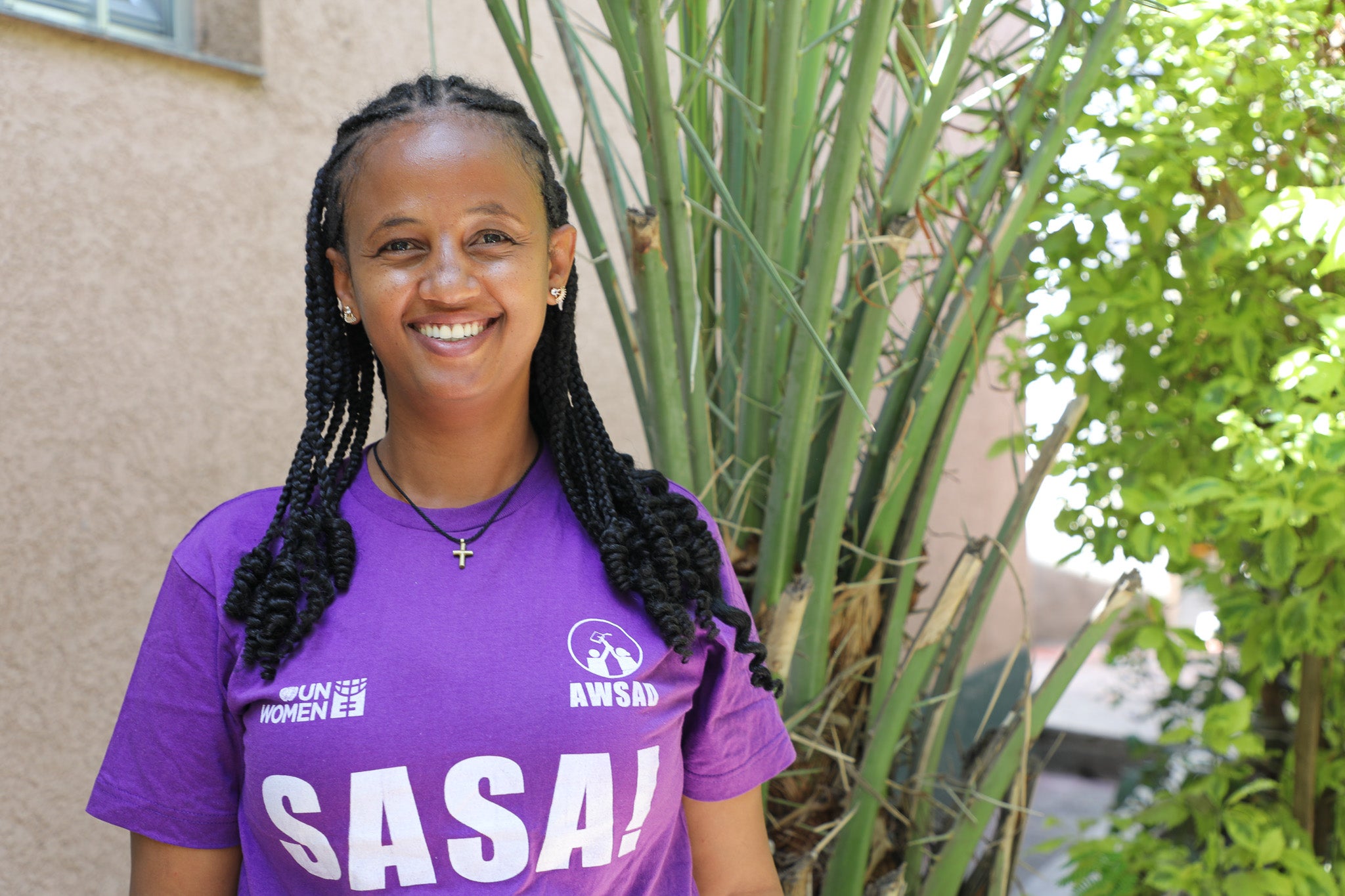
Kidist Abune, SASA! project coordinator at AWSAD. Photo: UN Women/Tensae Yemane
Educational materials that inform and support behaviour change, such as info sheets, power posters, game cards, comic pictures, are extensively used by community activists as a visual aid to provoke thoughts, show scenarios and simplify the concepts.
Media advocacy is another strategy used to reach a wider audience. The SASA! project hosts a weekly 30-minute program on Adama Broadcasting Service, a community radio that reaches audiences in and around Adama.
Bezawit Negussie, a community activist in the Oda district of Adama, noted that the first training changed her perception about the causes of VAWG, and she learned she can play a role in combating it. She is now teaching on VAWG, using power posters, at weekly credit and savings meetings in the district.
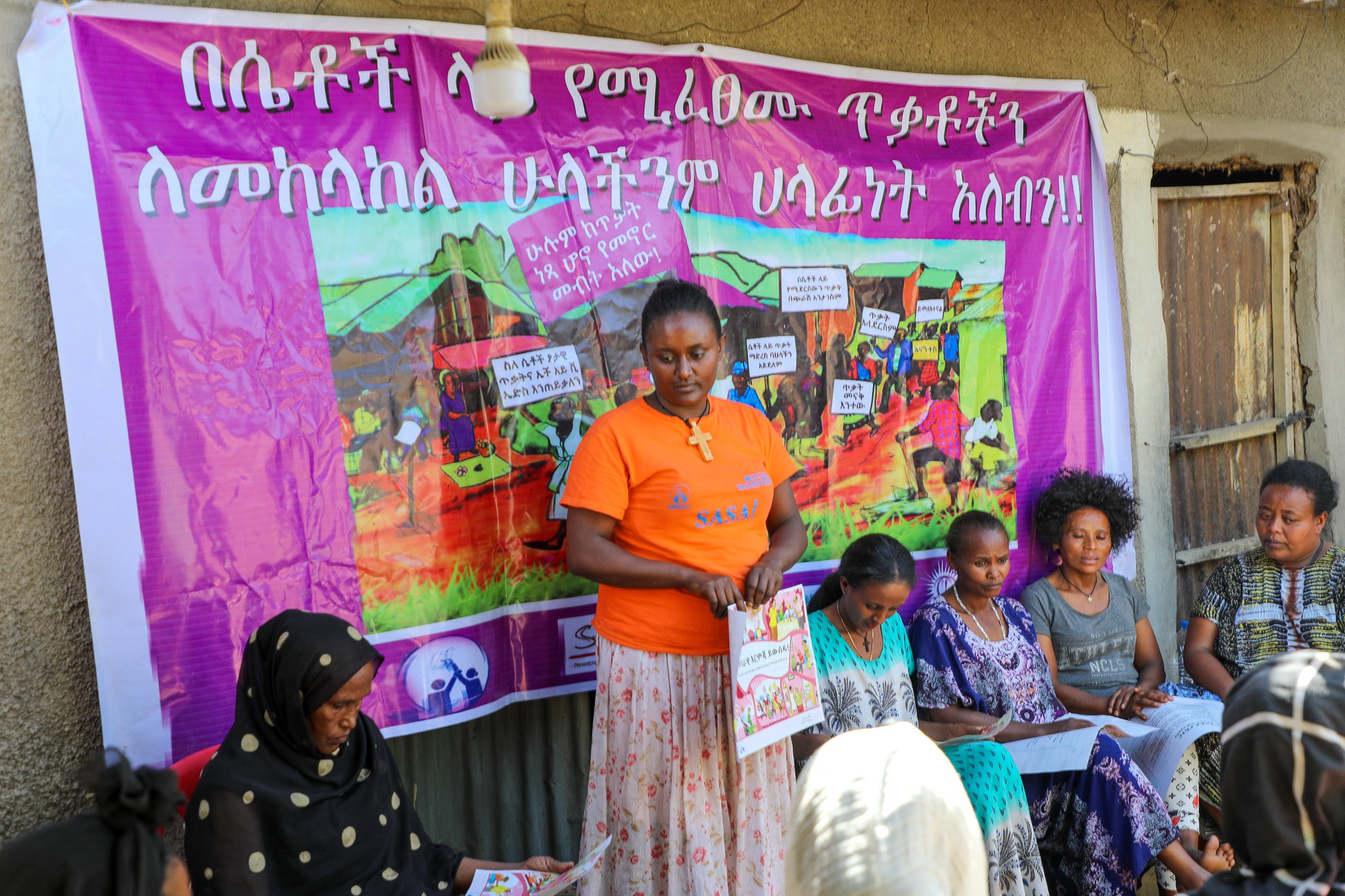
Bezawit Negussie, a community activist, sensitizing saving and credit members in Oda district, Adama, March 2025 Photo: UN Women/Tensae Yemane
“When we start five years ago, there was a challenge posed by the community, our teaching was considered to negatively change culture and to make women more powerful than men. Now there is a better understanding, accepting VAWG is harmful, its consequences and causes including power imbalance in relationships and marriages” Bezawit says.
Tadesse Eshetu, member of the group and participant in Bezawit’s session, says he has been a regular participant in the program since its start. He never thought VAWG was his concern; he believed women and men in such domestic disputes should handle it by themselves, and society does not need to intervene. “Participating in SASA! Activism here and in other places redefined what I knew about VAWG, its various forms from psychological to economic, and sexual relations without consent, even in marriages, which I never knew of. I even started sharing household chores, knowing the relationship dynamics were affected by my wife carrying all the burden of house chores and raising our children, I now am involved in my children’s day to day and school lives, the information I got from SASA! changed me” Tadesse notes.
Kidist mentions that to measure changes after SASA! interventions, assessments were being done at the end of each stage on knowledge, attitude, skill, behavior and action. A recent rapid assessment conducted following the completion of the third “Support” phase showed a significant change in knowledge, attitude and skills of the community on violence against women which is 91%, 80% and 50% compared to the base line value 73%, 54% and 23% respectively. “Beyond these numbers we saw changes as the community breaks its silence, even when perpetrators are family members. The community mobilized and opposed Femicide and expressed anger after a few cases in Adama,” she says.
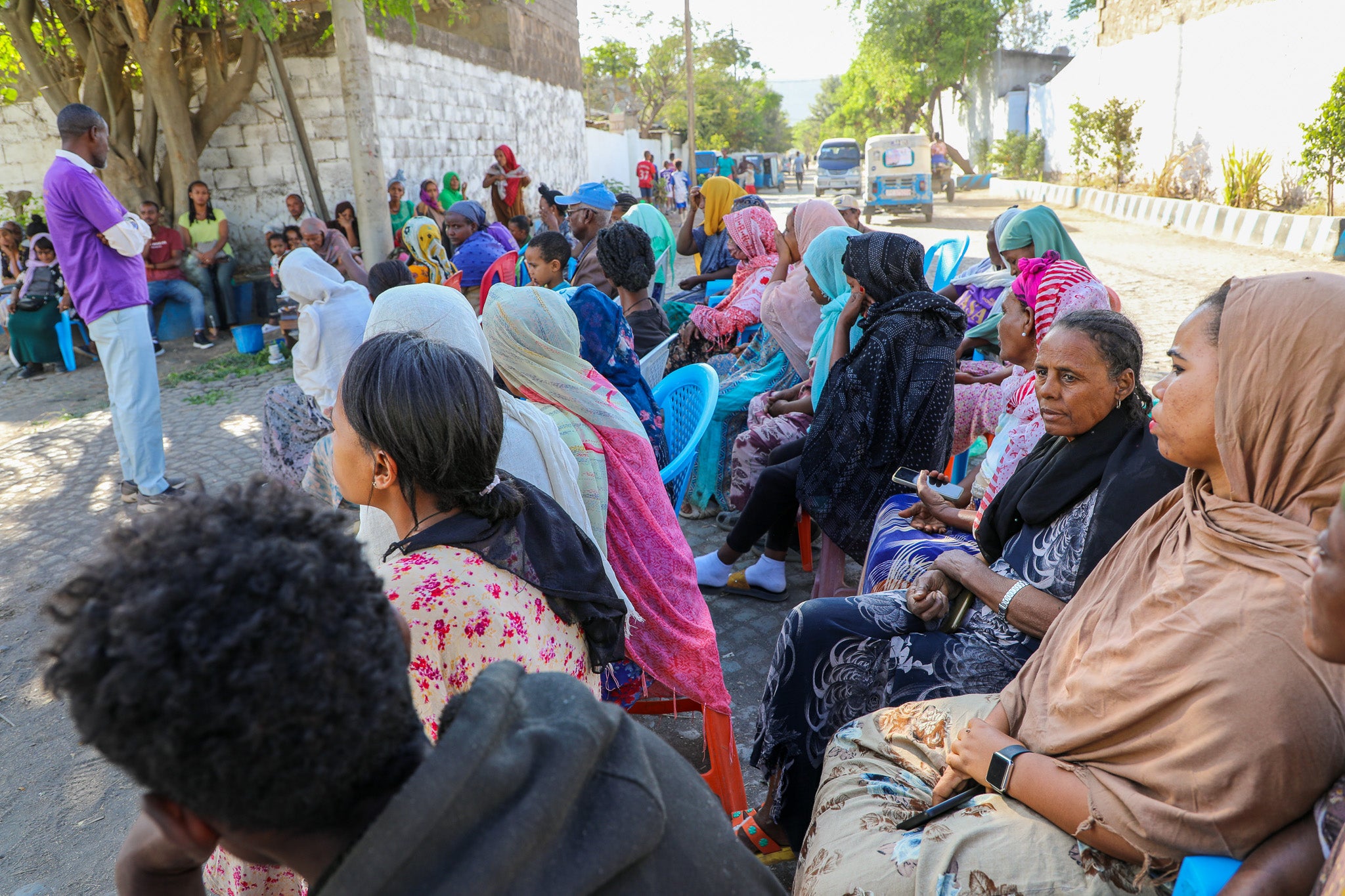
Street Forum drama happening in Oda Kebele, Adama. March 2025 Photo: UN Women/Tensae Yemane
According to her, before the intervention, the community used to think VAWG wasn’t a concern unless it happened to their own; they have now started to support survivors instead of pointing fingers. They are now intervening/telling them to seek help in domestic violence cases. Because community members are empowered to believe and know they have the power to prevent VAWG, they now challenge the older culture where forms of VAWG like rape were dealt with “mediation” and not by the law as domestic violence is involved.
Mestawet Negussie, a community action group member and staff at Bedatu Woreda Women’s Affairs office, reiterates Kidist’s statement on the changes SASA! has brought. According to her, the activism that she facilitates works because it goes to the community, neighbourhoods where women are sometimes isolated in their homes, enduring abuse of all forms. The coffee ceremonies undertaken where women are present, such as marketplaces, religious gatherings, raise the VAWG issues and bring the various forms - and how to respond to them- into the public knowledge.
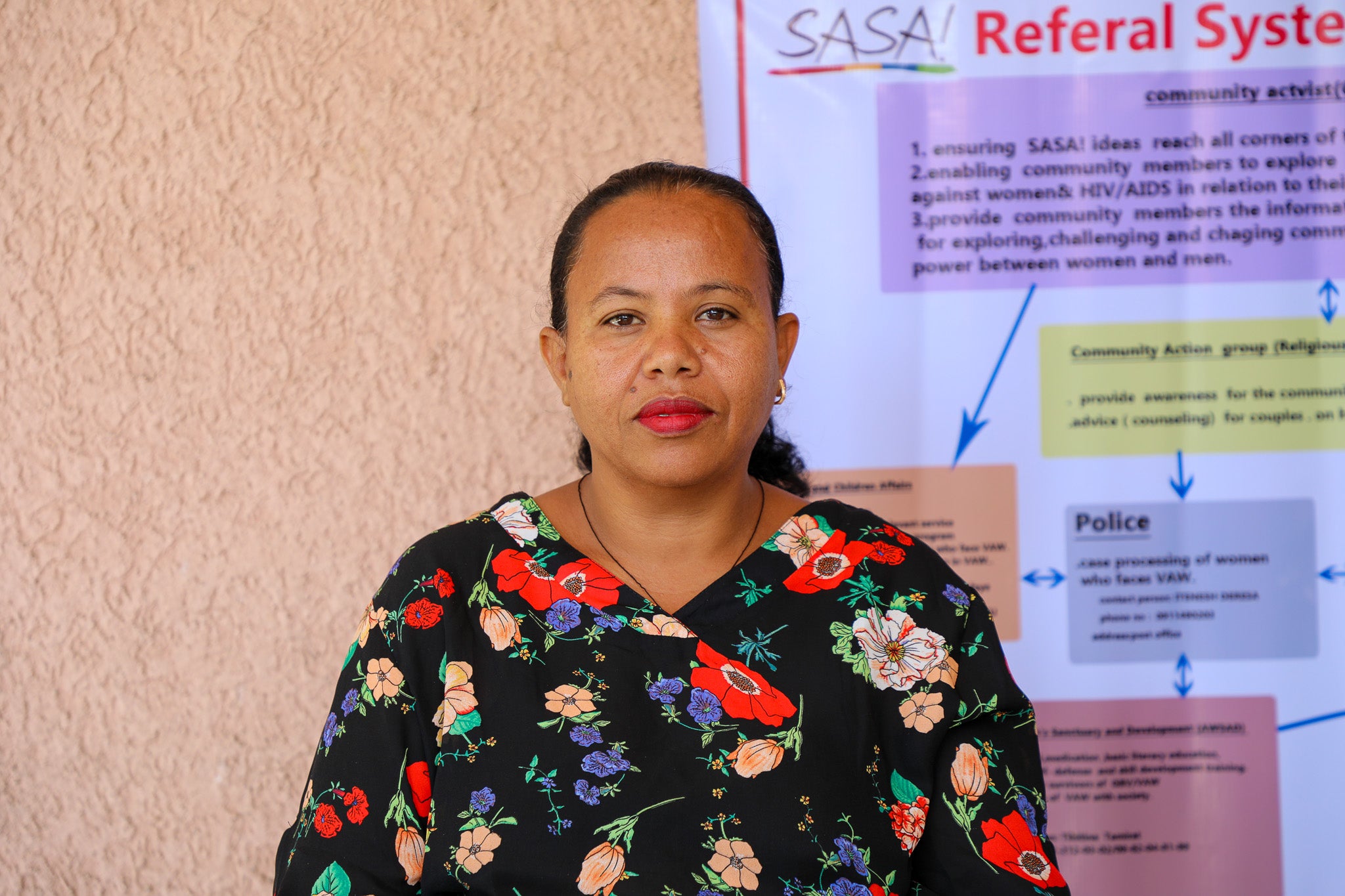
Mestawet Negussie, a community action group member, staff at Bedatu Woreda Women’s Affairs office. Photo: UN Women/Tensae Yemane
“People now know where to go to seek support if VAWG happens. This increased number of cases was reported to us. The sensitization also helps community members to investigate their own lives, the power dynamics at home, and work towards changing it for the better” Mestawet notes.
As indicated by Kidist, despite challenges such as expecting payment for volunteerism - NGO culture has created expectations - and some dropouts because of that, and the political system that resulted in quick turn over of community action group members and government actors, the project is doing well and bearing good results.
UN Women Ethiopia country office, supported by the Governments of Denmark, the Netherlands, Norway and Sweden, through its Ending Violence Against Women and Girls Programme has been supporting the implementation of SASA! Faith and SASA! Community since 2018/19 in selected districts of Adama, Oromia and Debre Birhan, Amhara regions.